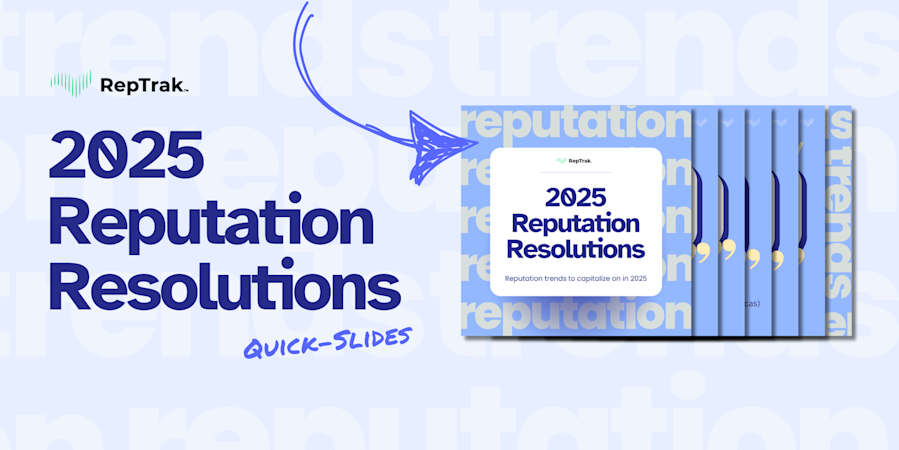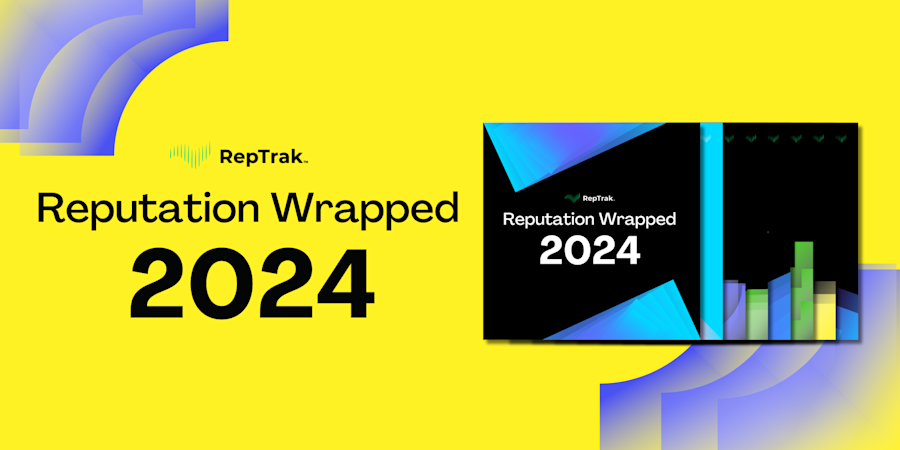This Month in Reputation: Correcting the Past and Planning for the Future
Blog Post07 Feb, 2020
This month, some companies looked to move on from painful pasts, while others made strong commitments to a sustainable future.
Higher purpose is top of mind for consumers and global reputation leaders
In January, we released our 2020 Global Trends in Reputation report, which surveyed more than 200 reputation leaders from companies around the world. According to this global cohort, higher purpose is the most important priority this year. Of the trends that have been ranked each of the past three years, only it and data privacy have gained importance. Other priorities for 2020 include responsible investing, influencers, and CEO activism.
These findings dovetail nicely with a new consumer study conducted by the National Retail Foundation (NRF) and IBM that found that consumers are not only willing to stop buying a preferred brand or product if they lose trust in the company, they are willing to pay a premium for products that align with their personal beliefs.
“The study's findings show that today's retailers need to be proactive in evaluating and understanding what drives current and future core buyers while still boosting margins for their business,” said Mark Mathews, VP of research development and industry analysis at NRF.
A focus on sustainability
Two priorities on our list of Global Trends are climate change and sustainability. Not surprisingly, then, there were multiple instances this month of companies taking action to save the planet and be more responsible.
In mid-January, Microsoft announced an ambitious plan to remove more carbon from the atmosphere by 2030 than it currently emits. The company aims to have removed more carbon by 2050 than it has emitted in the years since its founding in 1975. Microsoft also committed $1 billion to developing technology that will remove carbon directly from the atmosphere.
Toward the end of the month, Starbucks announced a multi-decade commitment “to become resource positive and give more than we take from the planet.” The company pledged to store more carbon than it emits, eliminate waste, and provide more clean freshwater than it uses—and to be transparent in reporting short- and long-term progress against its goals.
Elsewhere, IKEA, a longtime leader on sustainable practices, has condensed its considerable efforts into a series of ads that show how the company balances consumer needs, inclusiveness, and global stewardship. The ad was a collaboration between several company stakeholders, including HR, sustainability, and sales—and it illustrates the way many companies are including such purpose-driven efforts in their marketing.
Davos attendees prioritize corporate responsibility, inclusion, and stakeholder capitalism
The annual meeting of the World Economic Forum kicked off in mid-January in Davos with a special focus on sustainability and “stakeholder capitalism”—or capitalism that’s responsive not only to shareholders, but to customers, employees, and community members as well. (We were there; check out our recap.)
While there was a good deal of excitement at Davos for the concept of corporate purpose, there was also some skepticism. There’s a sense that companies must practice what they preach in order to avoid allegations of “purpose-washing,” where a company sells a socially conscious image while continuing to engage in socially and environmentally harmful business practices.
The prominence of purpose, corporate responsibility, and stakeholder capitalism at Davos reflects a major shift in political and economic thinking, brought on by the growing awareness of income inequality and climate change, and a new focus on diversity and inclusion.
Regarding that latter topic, Goldman Sachs CEO David Solomon announced in an interview with CNBC at Davos that, starting this summer, the investment bank would not take any company public that did not have at least one “diverse" board member, an acknowledgment that corporations must become more inclusive. He mentioned that, over the last four years, the performance of public offerings of U.S. companies with at least one female director is “significantly better” than those without. This is in line with our 2020 Global Trends report, which cited diversity and inclusion as a top priority for communications leaders this year.
Disney drops “Fox,” Red Sox drop Cora
In a break from the past, the Walt Disney Company announced this month that it was dropping the “Fox” from its recently-acquired 21st Century Fox assets to avoid unpleasant associations with Rupert Murdoch’s Fox News, whose partisan character (and sexual misconduct scandals) conflict with Disney’s family-friendly image. The 20th Century Fox name has been around since the company was formed in 1935 following a merger between Twentieth Century Pictures and Fox Film Corporation. Now, the 20th Century Fox film studio will be known as 20th Century Studios, and Fox Searchlight Pictures will be, simply, Searchlight Pictures.
In a similar move meant to shore up the organization’s reputation, the Boston Red Sox decided to part ways with popular manager Alex Cora, following Cora’s implication in a sign-stealing scandal during his time as a coach with the Houston Astros. The Red Sox themselves are still under investigation for similar transgressions under Cora’s leadership; those charges have yet to be adjudicated by Major League Baseball (MLB). With teams preparing to begin Spring Training, the cheating scandal has resulted in a dark cloud over the Boston and Houston teams, and MLB in general.
McDonald’s and Nissan look to move on from former CEOs
Family-friendly fast-food empire McDonald’s is looking to move on from the peccadilloes of its former CEO, who was finally fired in November for violating the company’s rules against dating employees. New boss Chris Kempczinski is looking to improve its workplace culture by restoring “decorum” and ridding the company of what some have described as a “macho, guys club” culture. And he’s looking for a top HR executive to help him do it.
Meanwhile, in Japan, Nissan is bracing itself for more accusations from ousted CEO Carlos Ghosn, who has jumped bail on financial misconduct charges and fled to Lebanon, where he will now be free to speak out on his issues with the Japanese justice system, which he claims “held him hostage.” Ghosn’s allegations could seriously hurt Japanese companies’ ability to recruit top foreign executives, who may now see the country as too big of a risk.
What stories about reputation have been catching your eye recently? I'd love to know! Share your thoughts on social media using the hashtag #RepTrak.
Martin Lieberman Director, Content Marketing The RepTrak Company [email protected]






